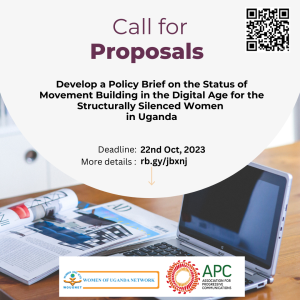In Uganda, the rights to Freedom of Expression and Access to Information are fundamental to democratic participation and accountability. However, the extent at which these rights are accessible particularly for women-led CSOs, female journalists and other marginalized groups remains undermined by existing legal frameworks which have become instruments of imposing power, curbing speech, discouraging free access and dissemination of information among women-led civil society organisations and journalists which intimidates them and leads to self-censorship.
While legal frameworks are designed to promote civic participation, their practical implementation oftentimes limits rather than empowers women to safely and freely participate in both online and offline spaces. Policies such as the Computer Misuse Act (2011) and the Public Order Management Act (2013), among others have been used to silence, curtail free expression and restrict access to information particularly among women in politics and media, thus resulting in surveillance and harassment.
On June 27th 2025, Women of Uganda Network with support from the Commonwealth Foundation hosted an X Chat discussion titled “Navigating Challenges to Women’s Rights to Freedom of Expression and Access to Information.” Held on X (formerly Twitter), the conversation formed part of the ongoing campaign #HerRightToKnow, which aims to raise awareness about discriminatory laws and policies that impede women from exercising their freedom of expression and accessing information. Additionally, it advocates for the meaningful participation of marginalized women in policy-making processes.
Uganda’s legal landscape has several policies that seem progressive on paper, but often fall short when it comes to implementation. The Constitution of Uganda (1995) guarantees freedom of speech and access to information. However, the implementation of these rights is inconsistent, particularly for women in leadership. Women-led CSOs and female journalists frequently encounter challenges such as online gender-based violence, trolling and self censorship influenced by the lack of inclusion in policy-making processes.
“Restrictive laws such as the Computer Misuse Act and the Regulation of Interception of Communications Act can be used to restrict freedom of expression and access to information, particularly for women and marginalized groups.” Omoi Stephen
In a world where information flows faster than ever, it is expected that everyone has access to information with no limits. However, that is a different case for many women and girls in Uganda. With the increased technological advancements, the digital divide remains evident and it’s women who often feel the impact as digital spaces have become sites of oppression and censorship instead of empowerment. Women and other marginalized groups often times experience online and offline gender-based violence including threats, doxxing and sexual harassment, more than their male counterparts.
“Women who speak out online on politics or rights issues often face cyberbullying, legal threats, or defamation cases, discouraging open expression and engaging with new technologies.” Birungi Oliver
Additionally, Government agencies often withhold information or delay responses to information requests which discourages transparency. For example for women-led CSOs, whose work is often community-based and dependent on credible data to drive social change, this lack of access undermines their ability to advocate for policy changes effectively. Female journalists face similar barriers, often being denied interviews, press briefings, or official documents simply because of their gender or critical nature of their reporting.
“Responses from the government are delayed or outright denied without justification or recourse. Journalists and activists who request sensitive information face threats & surveillance from public officials while Women-led organizations are often seen as “less legitimate.” Yamin Ahmed
The continued restriction of freedom of expression and limited access to information is shrinking the civic space, thus silencing and marginalizing more women in the digital and political spaces. These restrictions weaken their resilience, reduce their influence and their abilities to develop innovations in advocacy and community development.
To create a more enabling environment for women, Uganda needs to adopt and implement inclusive legal frameworks. First and foremost, gender-sensitive laws and policies that specifically address online gender-based violence. This includes criminalizing digital harassment and ensuring that law enforcement like the Cybercrime Unit is effectively trained to handle such cases with sensitivity and urgency.
Furthermore, women and women rights defenders must be actively involved in the policy-making process. This can be done through consultation with women-led CSOs, journalists and gender justice actors to ensure that laws are grounded in lived realities and respond to actual needs of the women communities.
Additionally, investment in digital security trainings and access to legal support can help women to effectively navigate the complexities of the existing laws while building resilience against digital threats.
For Uganda to fully realize its democratic promise, it must prioritize the protection and empowerment of women’s rights to Freedom of Expression and Access to Information, both online and offline. Only then, can we build a society where opinion and voice counts and no one is left behind.
Access the full discussion here
Written by:
Irene Marunga.K.





